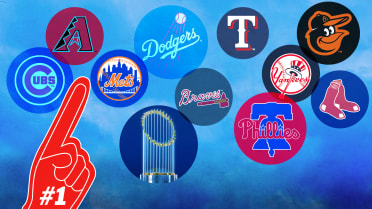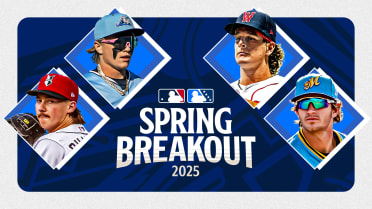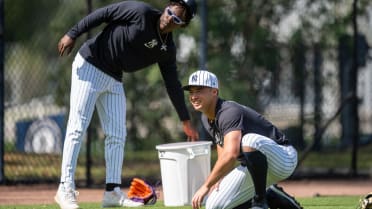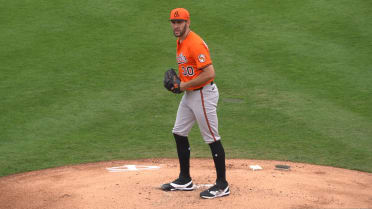OF deals at dizzying Deadline propelled ATL
ATLANTA -- Sometime after midnight, a little less than 16 hours before the 4 p.m. ET Trade Deadline on July 30, Braves president of baseball operations Alex Anthopoulos decided to call Marlins general manager Kim Ng one more time. Ng had been reluctant to move Adam Duvall over the previous couple weeks.
But as would be the case with Jorge Soler approximately 16 hours later, one more call would prove to be quite valuable for the Braves.
“We had been talking to them about Duvall for at least 10 days and it just wasn’t going anywhere,” Anthopoulos said. “That [late-night] call was a breakthrough conversation, but there would still have to be discussions the next day. Then finally around 12:30 or 1 o’clock, we got that deal done. We had been talking to the Indians [about Eddie Rosario] that morning, because we didn’t know what would happen to Duvall -- and the Soler talks had stalled.”
As the Braves prepare for this week’s National League Division Series against the Brewers, much focus will rightfully be placed on the tremendous value Anthopoulos gained when he reconstructed his outfield over the final four hours before the Trade Deadline. The deals were made while Atlanta was in third place and five games back in the NL East.
When the Braves oppose Milwaukee’s Corbin Burnes in Game 1 on Friday, their outfield will likely consist of Duvall, Soler and Rosario. Their fourth outfielder will be Joc Pederson, who was the first outfielder acquired after Ronald Acuña Jr. sustained his season-ending right knee injury on July 10.
What can’t be forgotten is that Anthopoulos wouldn’t have had the financial means to make these moves had Braves chairman Terry McGuirk not approached him in July to say a spike in early-season revenues had created an opportunity to be aggressive on the trade market.
“[McGuirk] said, ‘I want to reinvest whatever upside we’ve gained back into the ballclub,’” Anthopoulos said. “He basically gave me a large amount of money to work with. I was ecstatic. That’s a credit to those fans who came out and supported this club and put us in this position.”
Here’s a look back at how the three outfielders were acquired over the final hours before the Trade Deadline:
Duvall and Rosario acquired
Having seen Kyle Schwarber, Starling Marte, Joey Gallo and a few other outfielders already moved, Anthopoulos knew he was running out of options. Thus, he wanted to take one more chance at reacquiring Duvall, who had signed with the Marlins after helping the Braves reach last year’s NL Championship Series.
Not knowing he would land Duvall and eventually Soler, Anthopoulos was also still in communication with the Indians about Rosario. The Braves knew Rosario was hurt and may not play until closer to September. But without the ability to make August waiver trades this year, this was one last opportunity to add much-needed outfield depth to the organization.
It was during that call to Ng in the wee hours of July 30 that Anthopoulos began working toward the deal that brought Duvall to Atlanta in exchange for Alex Jackson, a catcher who didn’t have a future with the Braves.
“After that call, it felt like this was going to happen,” Anthopoulos said. “We wanted to talk about it internally, and [the Marlins] were going to do the same thing.”
While finalizing the Duvall deal around 12:30 p.m. ET, Anthopoulos and his group were also completing the trade that sent Pablo Sandoval to the Indians for Rosario. This was just a cost-savings move for Cleveland, which immediately released Sandoval.
The Braves were willing to take a gamble on Rosario, knowing he’d likely be out until September with the strained abdominal muscle he’d sustained in early July.
“Could [Rosario] have been back for the second week of August?” Anthopoulous said. “Yes, but how effective would he have been? I think us taking our time with him was really important, because he didn’t start off great with [Triple-A] Gwinnett.”
Final-minute try
As the final minutes before the Trade Deadline elapsed, the Braves acquired right-handed reliever Richard Rodríguez from the Pirates and surprisingly completed the last-second deal for Soler.
The Royals had made it known they weren’t going to move Soler if they had to eat any of the approximate $2.8 million he was still owed. But at around 3:30 p.m. ET, assistant general manager Jason Paré suggested the Braves call Kansas City one more time.
This led to the deal that brought Soler to Atlanta in exchange for Minor League pitcher Kasey Kalich.
Soler has been quite valuable while producing a .882 OPS and showing his plus power for Atlanta. But it should be remembered: He was hitting .192 with a .658 OPS when the deal was done. He was also essentially a designated hitter who hadn’t played much outfield recently. Still, the Braves took a chance and immediately threw him in right field when he arrived on July 31.
The initial plan was to do some defensive work with Soler and then put him in the lineup on Aug. 1. But manager Brian Snitker altered that plan with an early call to Anthopoulos on July 31.
“Snit said, ‘[Soler] is swinging the bat great, maybe we should put him in there today,'” Anthopoulos said. “My thought had been to get him acclimated, but I said I thought it was a great idea. That’s why this is a collaborative thing.”
Anthopoulos strengthened his clubhouse with the July 15 acquisition of Pederson, who has brought a winning attitude with his swagger. But he truly altered his team’s direction and the NL East race when he acquired three more outfielders. Figuring out what to do with all these guys was initially challenging, but ultimately very gratifying for Snitker.
“It’s just kind of like coming home with a bag of groceries and saying, ‘Here, cook dinner,’” Anthopoulos joked. “We just dumped four outfielders on him. We had been talking about Duvall, [Snitker] knew that. Rosario we didn’t know. And Soler, we didn’t know at all.”
Two months later, the Braves certainly know the value of the dedication Anthopoulos and his staff showed during the hours and minutes leading up to the Trade Deadline.
Supervising Club Reporter Mark Bowman has covered the Braves for MLB.com since 2001.




